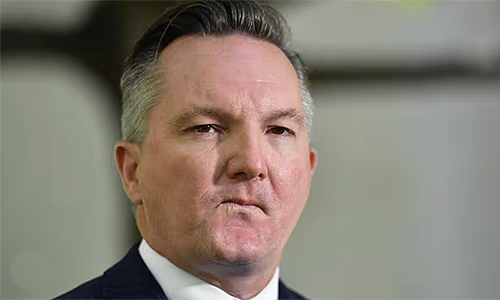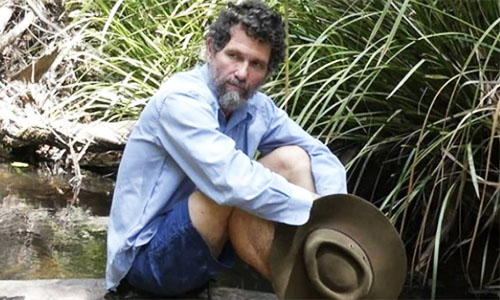
by FRED PAWLE – HAS anybody seen Energy Minister Chris Bowen lately? The man who was central to Labor winning the 2022 election has suddenly gone uncharacteristically quiet.
After single-handedly losing the election for Bill Shorten in 2019, Bowen was one of Labor’s star performers in its victorious 2022 campaign.
- These kind of nerds makes you want to slam your head in a car door.
- Years of unprecedented expenditure on failed green schemes has turned Bowen into electoral poison.
- Big business, having cuddled up to Bowen in 2022, is now jumping ship.
This is strange, though true. But you can now file it away with “Rolf Harris was once a children’s entertainer” and “Bankstown Hospital used to be safe for Jews”.
It’s alarming how dramatically things can change these days.
STRATEGY
The Guardian reported in the weeks after the 2022 election that Bowen was the implementer of the key strategy that got Labor over the line.
Six months out from the 2022 election, Labor was divided on how ambitious its election promises to reverse the effects of “climate change” should be.
Specifically, Labor wasn’t sure how many tonnes of carbon-dioxide it should promise to reduce from Australia’s emissions.
If, like me, this kind of nerdish jargon makes you want to slam your head in a car door, allow me to paraphrase The Guardian’s report in a way that is easier to understand.
Labor was torn over whether it should thoroughly destroy the Australian economy before 2030, or after.
To be fair, the incumbent Coalition Government was in on this too, proposing a policy that put it in the post-2030 group, which is where brilliant political strategist Bowen saw his chance.
Bowen later explained: “If we had just matched the Liberals on climate targets, we wouldn’t have won seats like Higgins and Bennelong and probably those voters in Wentworth and Kooyong would have said, what’s the point?
“We can’t change anything, so what’s the point?”
Labor won, but voters wound up asking themselves what the point was anyway.
Bowen was quickly thrust into the spotlight, announcing endless eye-wateringly expensive and impractical projects that he claimed would make Australia a “renewable energy superpower”.
By June 2023, Bowen was spinning his agenda faster than a windmill in a force-ten gale.
He launched the Net-Zero Authority, and boasted about having clocked up more than $40b on subsidies and other boondoggles for things like offshore windmills, batteries and dangerous, disruptive high-voltage cables strung across prime agricultural land.
Splashing around so much of other people’s money can make you giddier than a sailor on shore leave.
AGGRESSIVE
“Bring it on,” he famously and aggressively said of the Coalition’s new nuclear policy in September last year.
The Coalition duly brought it on – and Bowen ducked it like the loudmouth weakling he is.
He has deleted his X account and is conspicuously edging towards the exit.
He correctly read the room being in his favour in 2022, and he’s correctly reading the writing on the wall now, which says his three years of unprecedented expenditure on schemes that don’t work has turned him into electoral poison.
The cost-of-living crisis overshadows everything, and Bowen’s renewable largesse, the foundation for an energy transition that will sink the nation if it continues, is now the albatross around his neck.
Bowen has been reduced to announcing projects that are deliberately small enough to not attract attention from the media, lest the punters be reminded that he’s still one of the government’s senior ministers.
Hilariously, he recently announced a bilateral renewable energy partnership with South Korea that will supposedly reap benefits in hydrogen, clean energy technologies, green metals and carbon sequestration.
If he was really interested in clean energy, though, he’d ask his South Korean counterpart how many “emissions” are coming from Korea’s 27 nuclear reactors, generating 29 per cent of the country’s energy.
Big business, having cuddled up to Bowen in 2022, is now jumping ship.
“As much as everyone would like to believe that renewables will be cheaper, what we’re seeing right now is that energy costs are rising, and it’s putting a great challenge on business,” the Australian Chamber of Commerce and Industry’s David Alexander said last week.
Maritime Executive magazine reports that Shell is “effectively ending its involvement with the US offshore wind energy sector”, and writing off a cool US$1b of lost investments in the process.
That’s nothing compared to the hit Australian taxpayers will take as a result of Bowen’s tenure at the helm of Energy & Climate Change.
Bowen’s legacy will eventually amount to nothing more than a financial black hole that will sadly remain in place long after the last of his giant windmills have rusted through and crashed into the koala habitat beneath it.PC
.PC
– Fred Pawle
• Substack
• X
• TikTok
• Instagram













If we want to save the Australian Economy from total destruction, it is vitally important to be rid of this ghastly Labor excuse for a Government.
The most important reason is to consign that ghastly C. Bowen to the garbage bin of history. Then get rid of that worthless drain on taxpayer funds, Matt Kean.